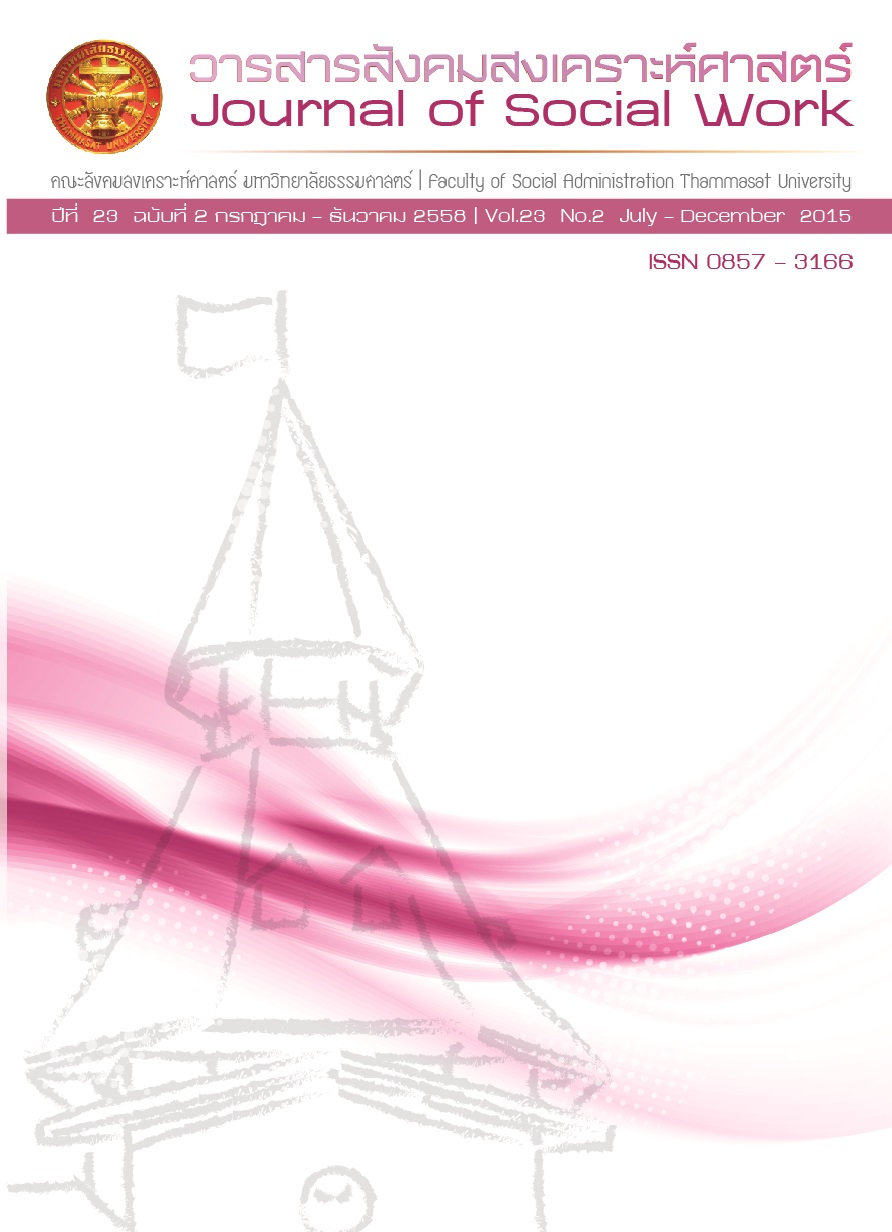Home Visiting in Health Social Work : Fundamental Concepts for Practices
Keywords:
Home visiting, Health social work, Fundamental concepts for practicesAbstract
This paper was aimed at reviewing the definitions of home visiting in health social work, its objectives and procedures in terms of the integration of principles and skills necessary for the social work. The guidelines for interviews and observations during the home visiting including the necessary issues and concrete examples from the experience of the author were also provided so that the social work students, novices, and persons interested in the social work could better understand the role and importance of home visiting including its impact on the quality of life of the clients and their families.
References
นงลักษณ์ เอมประดิษฐ์. (2541). การสังคมสงเคราะห์กับการให้การปรึกษา. กรุงเทพฯ : สำนักพิมพ์มหาวิทยาลัยธรรมศาสตร์.
ระพีพรรณ คำหอม. (2551). หลักการและกระบวนการปฏิบัติงานสังคมสงเคราะห์จุลภาค. กรุงเทพฯ: สำนักพิมพ์มหาวิทยาลัยธรรมศาสตร์.
วันทนีย์ วาสิกะสิน, กิติพัฒน์ นนทปัทมะดุลย์ และสุรางค์รัตน์ วศินารมณ์. (2543). ความรู้ทั่วไปเกี่ยวกับสวัสดิการสังคมและสังคมสงเคราะห์. ปทุมธานี: สำนัก พิมพ์มหาวิทยาลัยธรรมศาสตร์.
วันทนีย์ วาสิกะสิน. (2546). สังคมสงเคราะห์คลินิก. กรุงเทพฯ : สำนักพิมพ์มหาวิทยาลัย ธรรมศาสตร์.
ศิริจิตต์ คณากูล, ปรียานุช โชคธนวณิชย์ และศิรินิรันดร์ เอี่ยมละออ. (2551). แนวทางการปฏิบัติงานการเยี่ยมบ้านสำหรับเด็กติดเชื้อเอชไอวี. ใน วิฐารณ บุญสิทธิ และคณะ (บรรณาธิการ), คู่มือการเปิดเผยสภาวะการติดเชื้อเอชไอวีแก่เด็ก (น.104-115). กรุงเทพฯ: อักษรกราฟฟิคแอนด์ดีไซน์.
สายจิตร สิงหเสนี. (2541). สังคมสงเคราะห์จุลภาค. กรุงเทพฯ: สำนักพิมพ์มหาวิทยาลัย ธรรมศาสตร์.
สุรางค์รัตน์ วศินารมณ์. (2542). Home Visiting: การเยี่ยมบ้าน. ใน สารานุกรมทางสังคมสงเคราะห์ศาสตร์ (ฉบับทดลองใช้, น.185-186) กรุงเทพฯ: สมาคมนักสังคมสงเคราะห์แห่งประเทศไทย
สุรางค์รัตน์ วศินารมณ์. (2553). การบูรณาการในการปฏิบัติงานสังคมสงเคราะห์. กรุงเทพฯ : จรัลสนิทวงศ์การพิมพ์
สุรางค์รัตน์ วศินารมณ์. (2554). ทักษะการปฏิบัติงานสังคมสงเคราะห์. กรุงเทพฯ: สำนัก พิมพ์มหาวิทยาลัยธรรมศาสตร์.
อัญมณี บูรณกานนท์. (2556). การเยี่ยมบ้านของนักสังคมสงเคราะห์. ใน นันทภรณ์ เอี่ยมวนานนทชัย (บรรณาธิการ), เอกสารประกอบการฝึกภาคปฏิบัติ 1 ภาคฤดูร้อน/2556 คณะสังคมสงเคราะห์ศาสตร์ มหาวิทยาลัยธรรมศาสตร์ ศูนย์รังสิต (น.22-30). กรุงเทพฯ: มหาวิทยาลัยธรรมศาสตร์.
Allen, S., & Tracy, E. (2004). Revitalizing the role of home visiting by school social workers. Children & Schools, 26(4), 197-208.
Beder, J. (1998). The home visit, revisited. Families in Society: The Journal of Contemporary Social Services, (5), 514.
Canda, E. R., & Furman, L. D. (2010). Spiritual Diversity in Social Work Practice: The Heart of Helping. Oxford: Oxford University Press.
Cooper, F. (2012). Professional Boundaries in Social Work and Social Care: A Practical Guide to Understanding, Maintaining and Managing Your Professional Boundaries. London: Jessica Kingsley Publishers.
Dietz, C., & Thompson, J. (2004). Rethinking Boundaries: Ethical Dilemmas in the Social Worker-Client Relationship. Journal of Progressive Human Services, 15(2), 1-24.
Peterson, M. R. (1992). At personal risk: Boundary violations in professional–client relationships. New York, NY, US: W. W. Norton & Co.
Poindexter, C. C., Conway, P. G., & Valentine, D. P. (1999). Essential skills for human services. Belmont, Calif.: Brooks/Cole.
Thompson, N. (2000). Understanding social work: preparing for practice. Basingstoke [England]: Macmillan.
Trevithick, P. A. (2005). Social work skills: a practice handbook. Maidenhead, England: Open University Press.
Weiss, H. B. (1993). Home Visits: Necessary but Not Sufficient. The Future of Children, (3). 113-128.
Woodside, M., & McClam, T. (2006). An introduction to human services. Belmont, Calif., U.S.A.: Thomson/Brooks/Cole.
Downloads
Published
How to Cite
Issue
Section
License
The manuscripts published in the Social Work Journal is the copyright of the Social Work Journal, Thammasat University
Any article or opinion appeared in the Social Work Journal will solely be under the responsibility of the author The Faculty of Social Administration, Thammasat University and the editors do not need to reach in agreement or hold any responsibility.



